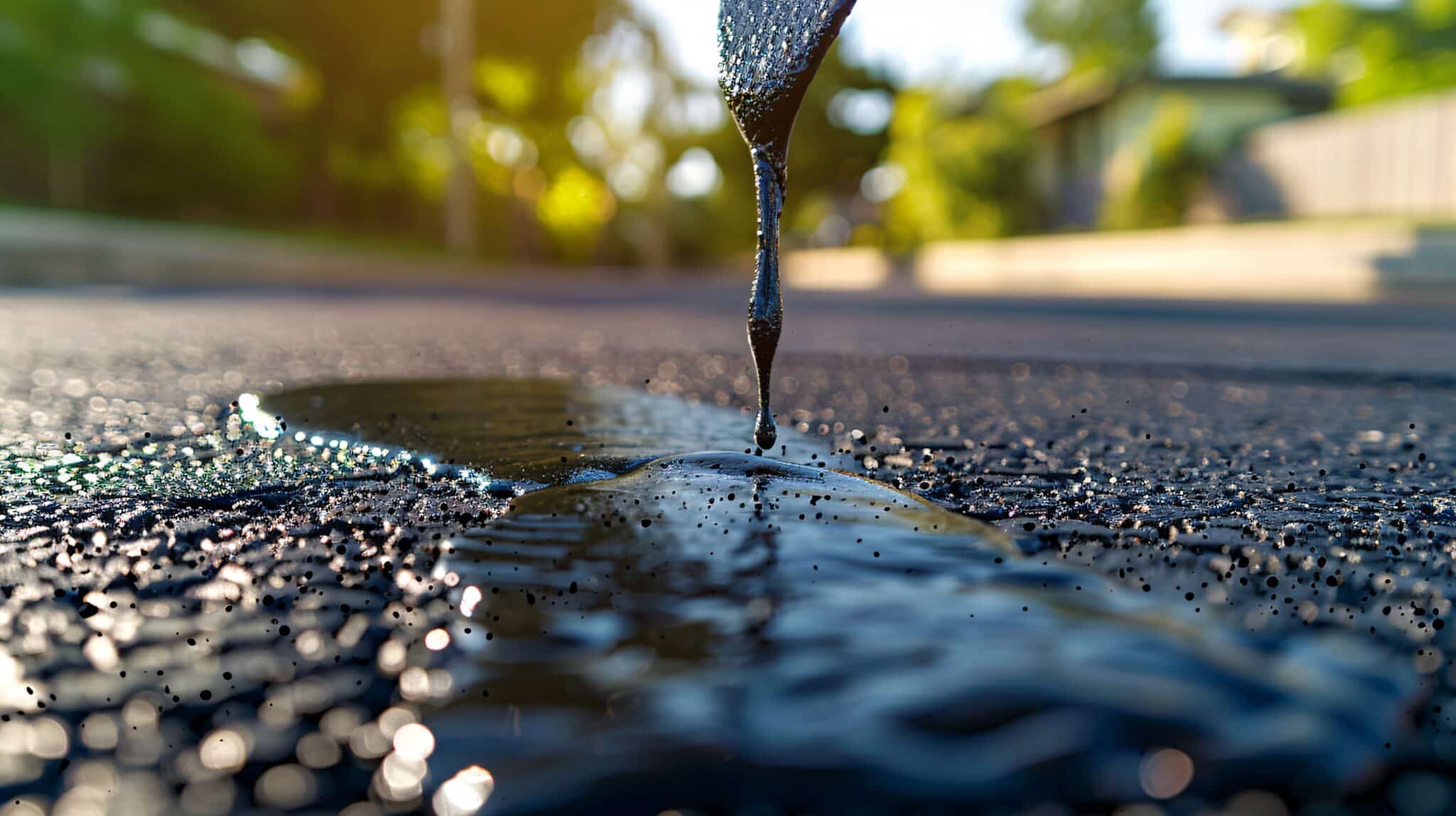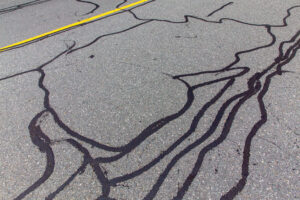Maintaining an asphalt pavement can be a tough job, especially if it is constantly subjected to heavy traffic and harsh weather conditions. Fortunately, there are many methods and techniques that can be used to prolong the life of an asphalt pavement and keep it in good condition. One method is chip seal. Chip sealing can be a cost-effective and efficient solution. Keep reading to find out more about chip seal and its uses.
What is Chip Sealing?
Chip sealing is a useful tool for pavement maintenance that involves applying a layer of liquid asphalt and an outer layer of aggregate stones. This process reinforces the asphalt surface and protects the underlying material from traffic wear and tear. Chip sealing can be traced back to the early 20th century when it was initially designed to preserve roadways without performing a full reconstruction.
The process of chip sealing begins with preparation of the existing asphalt surface. This step requires cleaning and filling cracks to prepare the pavement for a smooth application. Once prepared, a specialized truck spreads a layer of liquid asphalt that acts as a binder. Immediately afterward, aggregate—often gravel or crushed stone—is spread over the liquid asphalt for a strong adhesion. Finally, a roller compacts the aggregate into the asphalt to create a firm, healthy surface.
Chip seal is known for being an alternative to sealcoating. Sealcoating involves applying a single layer of petroleum-based sealant over the asphalt. While sealcoating provides a temporary barrier against moisture and UV damage, chip sealing offers a longer-lasting (5-7 years) solution that strengthens the pavement significantly.
Why is Chip Seal Used?
Now that you know how chip sealing works, you may be wondering why it is used instead of other methods. Here are some reasons why chip seal is a popular choice for pavement preservation:
Durability
One of the main reasons for applying a chip seal is for the added durability. The combination of brand-new liquid asphalt and aggregate creates a tough surface that can withstand the stress of heavy traffic conditions, which also reduces the frequency of repairs. This makes chip sealing especially popular for roads, parking lots, and driveways in high-traffic areas.
Cost-Effectiveness
Chip sealing is often more cost effective than traditional asphalt overlays or complete resurfacing. By using existing pavement as a base and adding a fresh layer, property owners can save big while still achieving great results.
Weather Resistance
Another benefit of chip seal is its ability to resist the damaging effects of weather. The aggregate layer helps protect the asphalt from rain, snow, and ice, while the liquid asphalt acts as a barrier against UV rays. These factors can cause the pavement to crack and fade over time. Weather resistance is an important quality in regions with extreme temperature conditions; however, property owners should still monitor their pavement temperature frequently to avoid safety issues and damages.
Traction
The textured surface of the chip seal, created by the outer layer of stones, makes it an excellent choice for roads and parking areas by providing good traction for vehicles. The rough finish also helps prevent skidding in wet conditions, improving safety for drivers and pedestrians alike.
Aesthetic Appeal
Chip seals can also brighten the appearance of asphalt pavement. The aggregate can be selected in various colors and sizes, allowing property owners to customize the look of their surfaces. This versatility makes chip seal an appealing option for residential driveways, commercial parking lots, and public roads.
While chip sealing offers many benefits, it is important to note that the success of this method depends on proper installation. Choosing a reputable contractor will make or break the overall performance and longevity of the surface.
What are the Pros and Cons of Chip Seal?
Chip sealing is often compared to other pavement maintenance methods, such as asphalt overlays and sealcoating. Here are some pros and cons to help you weigh the options.
Pros:
- Cost-Effective Maintenance: Chip sealing is a relatively cheap maintenance procedure, making it an attractive option for budget-conscious property owners.
- Extended Lifespan: When properly applied, chip seal can extend the life of asphalt pavement by several years, delaying the need for more extensive repairs.
- Rapid Application: The chip sealing process is relatively quick, which allows roads to be opened to traffic within just a few hours after application.
- Environmentally Friendly: Because chip seal utilizes existing pavement and requires less energy than producing new asphalt, it differentiates itself as a more environmentally friendly option. Some aggregate choices that use recycled materials can further the sustainability of chip sealing.
- Versatile Applications: Chip sealing can be used for various surfaces in a variety of locations. It is a worthwhile application for residential driveways, rural roads, and commercial parking lots.
Cons:
- Initial Surface Texture: The rough texture of freshly applied chip seal can be uncomfortable for certain wheels. This may cause unintended wear on passing vehicles.
- Loose Aggregate: Soon after application, there may be loose stones that don’t fully stick to the asphalt layer. Their presence can cause debris to build up on adjacent surfaces. Proper sweeping and maintenance are essential to mitigate this issue.
- Color Variation: The appearance of a chip seal can vary based on the type and color of the aggregate used, which may not meet the aesthetic preferences of the property owner or pedestrians.
- Temperature Sensitivity: Chip seal’s performance is less predictable in extreme weather conditions. In very hot climates, the liquid asphalt can become soft, while in cold climates, it might not adhere to the base asphalt as effectively.
- Limited Longevity: While chip seal can extend the life of pavement, it is not a permanent solution. Property owners will eventually need to consider additional maintenance options.
The decision to use chip seal should be carefully considered based on the needs and conditions of a surface. It is best suited for low-traffic areas that do not require a high level of aesthetic appeal or long-term durability.
Is Chip Seal Right for Your Property?
When deciding whether a chip seal is the right choice for your property, the following factors should be considered:
- Traffic Volume: If your property experiences high traffic volumes, the added durability of the chip seal may be a key advantage. However, for low-traffic areas, other methods may be more suitable and cost-effective.
- Existing Pavement Condition: Chip sealing is best applied to well-maintained asphalt surfaces. If your pavement is severely cracked or deteriorated, more extensive repairs should be done first.
- Budget: Chip seals offer a budget-friendly solution for extending the life of your pavement, but it’s essential to assess your budget and compare it to other maintenance options.
- Climate: Consider your local weather conditions. In areas with extreme temperatures, the performance of chip seals may vary, so it’s important to discuss this factor with a professional.
- Aesthetic Preferences: If the appearance of your pavement is important, consider how the texture and color of chip seal will align with your vision for your property and make decisions accordingly.
If you still need help determining whether chip sealing is right for your property, consult with a reputable paving contractor. They can assess the needs and conditions of your pavement and provide expert recommendations for maintenance or repair options.
Need Asphalt Maintenance? Superior Asphalt Can Help
If you are considering chip sealing or seal coating for your asphalt pavement, it is important to choose a reliable and experienced company to handle the job. Superior Asphalt has been providing quality asphalt maintenance services for over 35 years and has experience with various methods. Don’t let your asphalt pavement deteriorate due to neglect or improper maintenance. Contact Superior Asphalt today to extend the life of your pavement.





